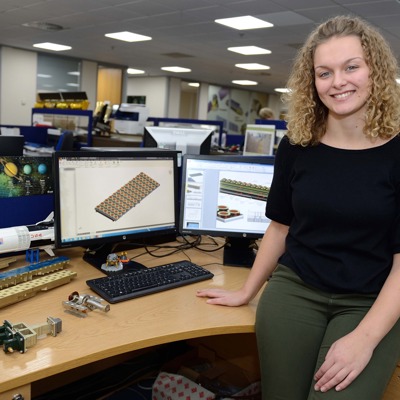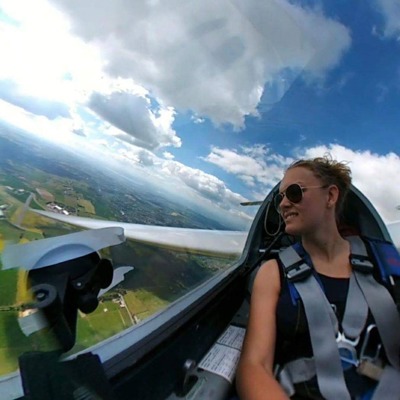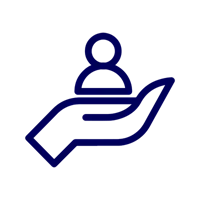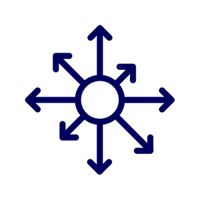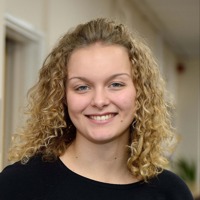
Harriet Gamble
Space Systems Engineer at Airbus
Engineers can build new things and change the world, the possibilities are endless so always stay curious and keep dreaming!
About Harriet...
Who am I?
"On the quiz I got Coach, Coordinator and Influencer. I think they are a pretty good summary of me. My job as an engineer definitely requires creativity, problem solving and attention to detail. I can also see on my personality types that it lists lots of people skills which I think is really important. I work in a big team so I have to be friendly and diplomatic and I spend a lot of time listening to other people’s ideas which helps me develop my own. Being able to communicate your ideas well to different people is really important, there is no point having great ideas if you can’t explain them to other people!"
What do I do?
"I joined Airbus straight out of University in September 2018 and went onto their Graduate Development Scheme for two years. The great thing about the scheme is that you get to go on placements and visit different parts of the company all over the world; working on lots of different projects I got to learn so much. Another great thing about the graduate scheme is you get to meet lots of other people like you who are just starting out in the company and go on training and team building courses together. When I joined the starting salary was £27,000.At Airbus my main roles is designing satellites which collect information about the Earth. These satellites range from about the size of a suitcase up to the size of a double decker bus and can tell us all about the environment. These satellites can help us to understand how the planet is changing; from the shrinking rainforests, to how the polar ice caps are melting and which volcanos might erupt next. All this information is very important and is called Earth Observation, one of the best ways to collect all this data is from way up in space.To collect data each satellite has a payload; which could be something like a camera or a sensor, this is the area I focus on. Normally each earth observation payload is a new design, because they can have so many different purposes, so there is always a new design challenge to tackle. This kind of work involves Maths and Science but also needs some creativity and imagination. Being a Systems engineer means I get to be involved in the full design and see the bigger picture. Part of my work is making sure the final satellite we deliver is exactly what our customers asked for. At Airbus we make satellites for customers all over the world.I am currently working on a project for the European Space Agency (ESA) where we are designing a new SAR satellite to join the Copernicus Program. This is a mission will provide loads of data to help Europe understand climate change, how we are affecting it but also look at things like land use for farming to help work out when it is best to sow seeds, collect crop etc. so we can grow more food and help stop global hunger. You can find out more about the Copernicus Program here: https://www.copernicus.eu/en/about-copernicus/ Here are two of the other projects I have worked on:NovaSAR: https://www.bbc.co.uk/news/science-environment-46312874 Zephyr: https://www.youtube.com/watch?v=aSPn1Rqr9jg "
How did I get here?
"When I was younger my Dad ran an engineering company which made lots of parts for trains so I knew a bit about engineering from when I was quite small. As a teenager I helped in my Dad’s business with making things and running the machines but the bit I was really fascinated with was how they were designed. I was also amazed at the idea of going into space and did loads of reading about the Apollo missions to the moon, the Space Shuttle and the International Space Station (ISS). In the end I decided what I really wanted to do was design things to go into space so picked to do an Aerospace Engineering degree.I did some research and found that to do an engineering degree I would probably need A-Levels in Math and Physics so I picked these two. I also did Further Math and Electronics as I thought they would be really useful to an engineer. Looking back I probably could have picked some other different subjects I liked, like Geography, so I had some variety in my revision!I chose to go to the University of Bath to do my degree as I really liked the feel of the university on the open day and could picture myself living there as it had lots of green open space and I love being outdoors. One of the benefits of the degree I chose is you could do a Year in Industry in the middle of the course, this means I studied for two years, worked for one year, and then went back to finish my degree. For my year working I applied to Airbus Defence and Space in Portsmouth and was really pleased when my application got accepted. I loved my time working there, I got stuck in with designing satellites and helping to build one too. The one I helped build actually launched in 2018 just before I finished university, which was an amazing feeling. I loved my Year in Industry so much that I applied straight to Airbus when I finished my degree and that is where I am now!"
The life I live
"In my spare time I like to be outside as much as possible. Most weekends I go gliding (it’s like a plane without an engine) it is an amazing feeling to soar like a bird through the sky, gliders can travel for hundreds of kilometres so there is always something new to see. I started gliding when I joined university but you can actually fly solo from 14 years old, it’s a great way to get into flying and learn more about how aircraft work. I also enjoy camping and horse riding or just curling up with a good book."
My typical day
"So my days are quite varied but I normally start work between 7.30 and 8am. In my office we work flexitime which means we can start any time before 9.30am and finish from 4pm as long as we do 37 hours work per week. I always start early so I have my evenings free for hobbies but some people prefer to get in as late as possible. First thing I do is check my emails, grab a cup of tea and work out a to-do list for the day to make sure I keep on track with all my tasks. What I do next depends on the stage of the project I am currently working on.-\tWhen we first start projects there is loads of research and documentation so I am at my desk most of the time looking on the internet, through old project reports or talking to colleagues.-\tWhen I am doing design work I use CAD (computer aided design) tools to draw the payload and sometimes we visit other companies who we might be working with. -\tOften there are calculations to do which work out how heavy the satellite will be, what temperatures it could work in (temperature of +100⁰C to -100⁰C are quite common in space) and if it is strong enough to survive a rocket launch. This normally involves a team to get all this work done and we will adjust the design if needed.-\tSome days I spend time in a clean room (like a laboratory which makes sure no dust or particles get on things) where we can assemble parts. This is often delicate work.In between doing all these things on a few different projects, there are meetings with the customer, which sometimes means I get to travel to other countries, and documents to write up so I am always pretty busy!"
My qualifications
"A-level Math, Further Math, Physics, Electronics * AS-level ChemistryAerospace Engineering Degree (MEng) from the University of Bath"
Harriet's Photos
